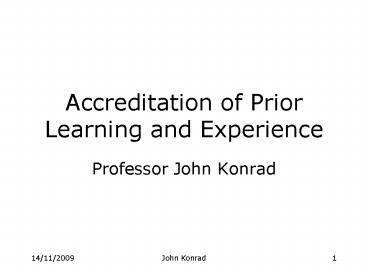Accreditation of Prior Learning and Experience - PowerPoint PPT Presentation
1 / 10
Title:
Accreditation of Prior Learning and Experience
Description:
Recognition of acquired skills develops informally after World War I in France ... recognised the role of off-campus learning and wish to accredit such learning. ... – PowerPoint PPT presentation
Number of Views:18
Avg rating:3.0/5.0
Title: Accreditation of Prior Learning and Experience
1
Accreditation of Prior Learning and Experience
- Professor John Konrad
2
Origins
- Recognition of acquired skills develops
informally after World War I in France and is
then formally recognised in the 1930s la
Validation des Acquis Professionnels - VAP - Accreditation of Prior Learning APL and
Accreditation of Prior Experiential Learning
APEL develops in the UK in the 1980s - European Commission Memorandum (2000) and
Recommendations (2001) introduce Valuing
Learning
3
Definition of APEL
- APEL is the accreditation of prior experiential
learning, that is, the award of credit for
learning based on prior experience -- from work,
community or volunteer experience -- which has
not previously been assessed and/or awarded
credit.
4
Qualifications APEL
- identification of learning, wherever and whenever
this has taken place - selection of that learning which is relevant to a
desired outcome or progression route or pathway - demonstration of the validity and appropriateness
of this learning - matching learning outcomes to those stated within
a chosen accreditation or progression framework - assessment of evidence against predetermined
criteria to ensure the validity of the claimed
competence.
5
Quality Issues
- The evidence presented should be
- Authentic the competence demonstrated should be
genuine - Direct that the learning is specific, relevant
and has been identified and categorised - Broad that the learning took place in a wider
theoretical and vocational context which was
understood by the applicant - Current the learning is sufficiently recent to
be relevant to currently proposed award.
6
What is Credit?
- Credit is a quantified means of expressing
equivalence of learning. Credit is awarded to a
learner in recognition of the verified
achievement of designated learning outcomes at a
specified level.
7
Learning Outcomes
- Statements of what a learner is expected to know
understand and/or be able to demonstrate after
completion of a process of learning. When used
in association with their related assessment
criteria, learning outcomes reflect the level at
which the learning has occurred.
8
A credit framework
- A credit framework is a set of specifications for
valuing, measuring, describing and comparing
learning achievement. The framework is
concerned with the demonstration of learning
achieved, how much learning and at what academic
level, and is designed to include learning from a
wide range of environments, both on and off
campus.
9
Why do we need a credit framework?
- The learning environment is increasingly becoming
broader than traditional institutional, didactic
or formal course based settings. - This trend comes from current UK and EU policy,
which encourages a culture of Lifelong Learning,
with closer links to the workplace in part
because many educational establishments have
recognised the role of off-campus learning and
wish to accredit such learning.
10
Categories of General Outcomes
- Knowledge and understanding
- Practice (Applied knowledge and understanding)
- Generic cognitive skills
- Communication, numeracy and ICT skills
- Autonomy, accountability and working with others.






























